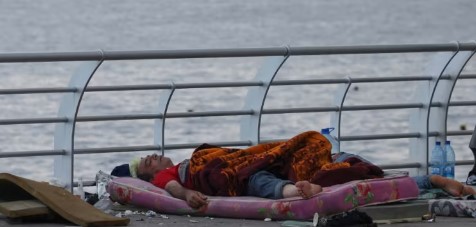The ongoing conflict between Israel and Hezbollah has led to increased tensions within Lebanon, particularly against those perceived to have connections to the Iran-backed group. Israeli airstrikes have intensified, targeting Hezbollah members while indiscriminately impacting civilians, prompting a growing fear among local residents regarding the presence of displaced families. For instance, Christina, a 30-year-old Lebanese woman, shared her experience of housing displaced individuals from Dahiyeh, a Hezbollah stronghold, only to quickly face backlash from her neighbors. The fear that these new residents might have affiliations with Hezbollah led her to request their departure, highlighting a broader anxiety that many feel about harboring those associated with the militant group.
Hezbollah remains a significant force within Lebanon, especially among the Shiite Muslim community, owing to its historical role and continued military capabilities. However, the group’s decision to engage in conflict with Israel has polarized public opinion in Lebanon. The intricate power-sharing system in the country, which allocates authority among various religious sects, has left many wary of a renewed conflict that could devastate the fragile balance. The memories of Lebanon’s civil war, which saw widespread displacement and violence, still loom large over the populace, fostering suspicions towards those fleeing current violence, particularly when they belong to the same religious community as Hezbollah.
As the situation escalated, Israel’s bombardment resulted in a significant humanitarian crisis, displacing over a million people—approximately one-sixth of Lebanon’s population. The influx of displaced families into urban centers such as Beirut has overwhelmed the city’s already strained infrastructure, leading to deteriorating living conditions. Residents like Souheir, a 58-year-old homemaker, expressed their dismay at the increasing visibility of Shiite cultural symbols, such as chadors and bearded men, which evoke feelings of paranoia. The atmosphere in the capital has become charged with fear as locals increasingly view each other with suspicion, uncertain of who could be aligned with Hezbollah.
Outside Beirut, the tensions have similarly manifested in more conservative communities. As Israeli airstrikes expand their reach, displaced individuals have begun to settle in regions that previously did not experience such an influx. Emad, a Druze villager, reported that initial willingness to rent homes to the displaced has turned into cautious hesitation, driven by the uncertainty surrounding the identity of new arrivals. Similarly, in predominantly Christian areas, the displaced have found refuge primarily in shelters rather than in private homes, as concerns over potential Hezbollah affiliations create apprehension among residents.
The historical context of Lebanon’s civil war contributes to current fears surrounding the displaced persons. Incidents of individuals breaking into empty properties in search of shelter have revived traumatic memories for many, with parallels drawn to the displacement and chaos of the 1970s and 1980s. Riad, a businessman, recalled the pain of losing property to armed groups during the earlier conflict, underscoring that the scars of past displacements affect today’s responses to the crisis. While the police have reported only a few instances of break-ins, the anxiety surrounding housing displaced families is palpable, with residents cautious of losing their homes once more.
Ultimately, the entanglement of current events with Lebanon’s complex sectarian landscape and painful history of conflict reveals the multifaceted challenges that the country faces. People are wrestling with their humanitarian instincts to help displaced individuals against the backdrop of a pervasive fear that past traumas could repeat. The uncertainty surrounding the future of these displaced families and the potential consequences of the ongoing hostilities continues to amplify divisions within Lebanese society as they grapple with the impact of external conflicts on their local communities. As the crisis unfolds, the social fabric of Lebanon remains fragile, strained by fear and distrust, burdened by a legacy that looms heavily over contemporary events.














